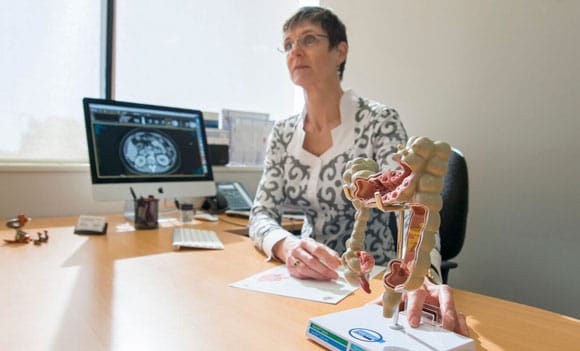What is ulcerative colitis?
Ulcerative colitis is a chronic inflammatory disease of the large intestine (colon and rectum).
It is an autoimmune condition. This means that your immune system thinks parts of your bowel lining is foreign and it attacks it.
The attack by the immune system creates inflammation of the colon and rectal wall. This leads to ulcers and bleeding, and to symptoms such as pain and diarrhoea (sometimes bloody).
Ulcerative colitis and Crohn’s disease are collectively known as inflammatory bowel disease (IBD). More than 75,000 Australians have IBD. Inflammatory bowel disease should not be confused with irritable bowel syndrome (IBS).
Having ulcerative colitis increases your risk of colorectal cancer.

What are the symptoms of ulcerative colitis?
The symptoms of ulcerative colitis can be mild, moderate or severe. They tend to fluctuate over time, with periods of ‘flare up’ and periods of ‘remission’.
The most common symptoms of mild ulcerative colitis are:
- mild crampy abdominal pain
- mild diarrhoea (fewer than four bowel motions a day)
- intermittent bleeding from the rectum
- passing some mucus from the rectum
- bouts of constipation.
If you have severe ulcerative colitis, you may have:
- frequent, loose bloody stools (10 or more a day)
- anaemia (from losing blood in the stool)
- severe abdominal pain
- fever
- weight loss.
As with Crohn’s disease, symptoms of ulcerative colitis can also occur outside of the digestive tract including the joints (e.g. hip and knee swelling and pain), as well as the eyes, skin and lungs.
What causes ulcerative colitis?
Why your immune system attacks your gut is not known. It might be due to an abnormal immune system response to normal gut bacteria or a virus.
There may be a genetic cause as it appears to run in some families.
How is ulcerative colitis diagnosed?
Ulcerative colitis is usually diagnosed based on your symptoms, a physical examination and some tests.
Tests that may be done to diagnose ulcerative colitis and to rule out other conditions (e.g. Crohn’s disease, diverticulitis) include:
- blood tests
- faecal tests
- X-rays
- colonoscopy.
Sometimes CT or MRI scanning may be needed.
How is ulcerative colitis treated?
Treatment for ulcerative colitis aims to end your symptoms and prevent symptoms returning. Your treatment will depend on what symptoms you have and how severe they are.
Diet
Many people find that some foods and drinks make their symptoms worse. Common culprits include dairy products, coffee, alcohol, fruit, spicy food, breads, beans and lentils.
If there are foods that trigger or worsen your symptoms, try to avoid them.
Medical treatment
Ulcerative colitis is most commonly managed by a physician with specialist training in inflammatory bowel disease (a Gastroenterologist). If your symptoms include rectal pain, rectal bleeding and mild diarrhoea, your treatment will include anti-inflammatory medications. Typically, you apply these to your rectum via enema, suppository or foam. Rectal medications include 5- aminosalicylic acid (5-ASA) or corticosteroids.
This treatment stops symptoms in up to 90% of people. Up to 70% of people can prevent further flare ups with this treatment.
If your symptoms are moderate to severe, or a larger area of your colon is affected, you will probably be given an oral 5-ASA medication. This is sometimes given along with a rectal treatment.
If your symptoms are severe, you may need an oral corticosteroid until symptoms improve.
Other medications may be needed if you do not respond to the usual therapy. These medications often have significant side effects.
Surgery
As ulcerative colitis only affects the large intestine, surgical removal of the large intestine can cure the disease. Surgery may be necessary should you develop complications of ulcerative colitis or if your body does not respond to medication. In this case your gastroenterologist will refer you to a colorectal surgeon.
Your colorectal surgeon has several surgical options to treat ulcerative colitis including:
- removing some or all of the colon and the diseased lining of the rectum. The end of the small intestine (the ileum) is then connected to the anal canal. This allows you to have relatively normal bowel movements
- removing all of the large intestine (colon and rectum). Your specialist surgeon then sews your anus closed and makes a small opening called a stoma in the skin of the lower abdomen. The end of the small intestine is connected to the stoma, creating an opening to the outside of the body. Waste is collected into a bag.
Your ulcerative colitis specialist will help you decide if surgery is a good option for you.
